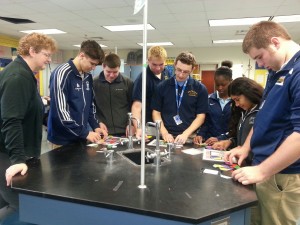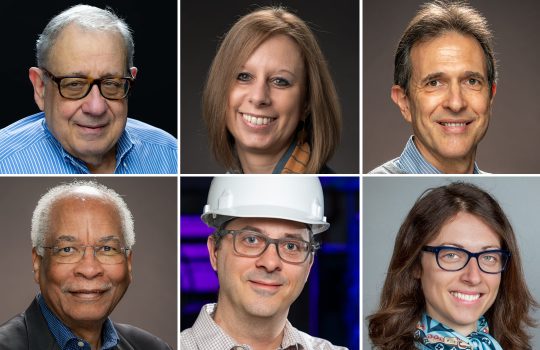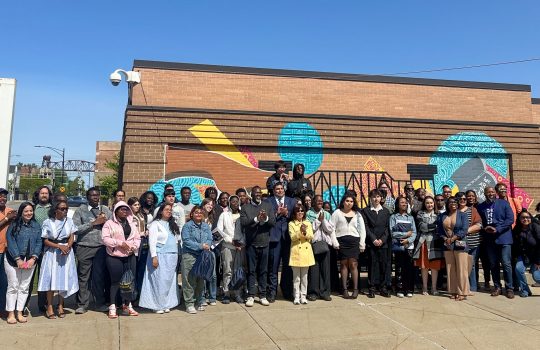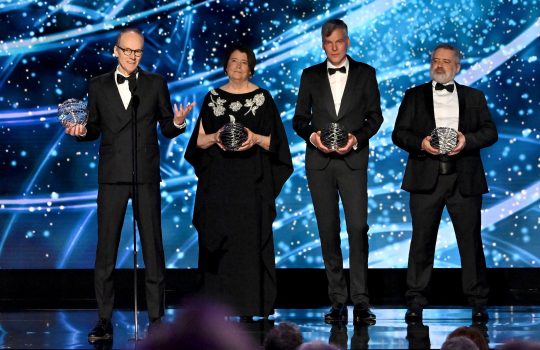
Students at Riley High School recently attended a QuarkNet masterclass to learn how to analyze data from the CMS experiment at CERN. Photo courtesy of Susan Sakimoto
As organizations and institutions around the United States push for higher standards in science and mathematics education, some communities have to get creative in finding sufficient resources to meet these expectations. One teacher in South Bend, Indiana, reached out for better opportunities for its students.
On March 18, Riley High School juniors and seniors attended a QuarkNet masterclass to discuss some of the research and analysis they conducted during this spring semester. According to a 2015 Indiana Department of Education review, Riley is one of the more diverse schools in the state: Nearly 30 percent of its student population is black, and 20 percent are Hispanic.
During the QuarkNet program, the students received first-hand experience working with data from the CMS experiment at CERN.
“The masterclass helps students understand how we reconstruct data in our detectors and identify the mass of each particle event in the data collected,” said Daniel Karmgard, a Fermilab visiting scientist, QuarkNet mentor and a physics professor at the University of Notre Dame. “Part of what we’re showing them is how to apply concepts they have already learned in the classroom to particle physics.”
The one-day masterclass is meant to provide an engaging way for students to do physics – one that closely resembles how particle physicists do their own research.
“The usual classroom science course can be quite bland because of all the worksheets and normal labs done in high school,” said Ben Dowd, an 18-year-old senior participating in QuarkNet masterclass program. “I really enjoyed listening to our masterclass mentor; he was very educated, and I felt like I learned a lot from him. He explained some of his work on CMS, then during the videoconference, the moderators explained what they did at Fermilab with their research, and it was extremely fascinating.”
In the few weeks leading up to the masterclass, the students were introduced to particle physics, learned how to analyze the data coming from the LHC and then got started on research and analysis. On the day of the masterclass, students from teacher Susan Sakimoto’s class at Riley went to Notre Dame University and attended a videoconference moderated by Fermilab physicists. Students from Zurich, Switzerland, and Catania, Italy, also pooled their results from their CMS data analysis and joined the conversation.
Depending on the results the students obtained, the QuarkNet mentor and moderators can show the students evidence of a Z boson, J/Psi and Upsilon mesons or the Higgs boson.
“My students always enjoy this experience,” Sakimoto said. “They like learning something real and having their own data. It’s also a great link to the Higgs boson news events, since the students find some Higgs boson candidates.”
Erik Bidwell, an 18-year-old senior who attended the masterclass, said he is doing an independent study on Einstein’s theory of relativity this semester.
“I never understood how much the LHC incorporated relativity in their particle physics research,” Bidwell said. “I was already interested in pursuing a job in science, but the masterclass allowed me to expand my knowledge of a future in physics, and the topic interests me more than ever before.”
The QuarkNet masterclass program proved to be an effective way to teach students applicable and collaborative physics. Interested teachers submit requests to a QuarkNet program for their physics students to participate in masterclasses.
Prior to teaching at Riley, Sakimoto was a geophysics assistant professor at Notre Dame and a research scientist at NASA’s Goddard Space Flight Center in Maryland. This is the third year she introduced her Riley students to QuarkNet, and she is delighted by their enthusiasm.
“QuarkNet masterclasses help all of my students stay interested in physics and willing to participate,” she said. “It is particularly welcome in sparking interest in women and minorities, who are traditionally not well-represented in physics.”



